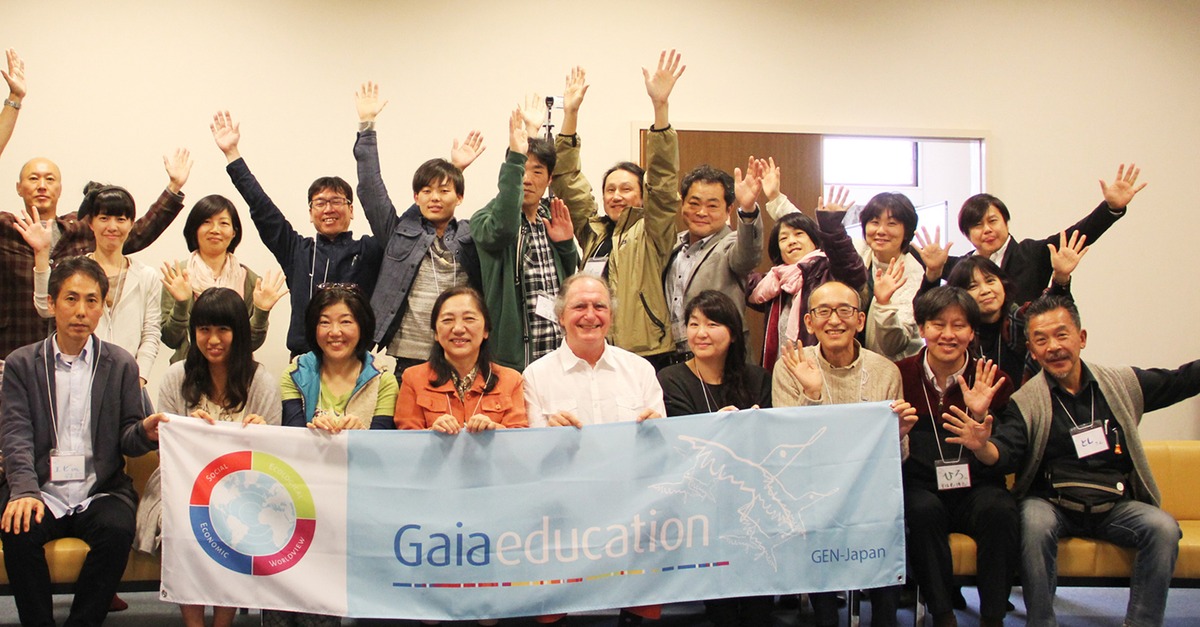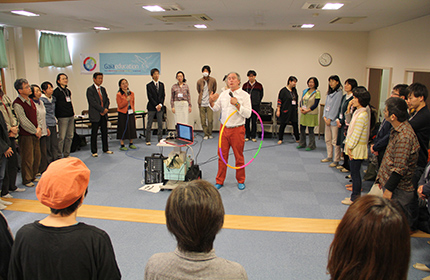<< For Entrepreneurs aiming at sustainable new economy | main | Introduced as a model project in Germany! >>
Gaia Education certified EDE by As One Network Community in Japan

In April, the As One Network Community hosted a Gaia Education certified EDE in Japanese.
EDE Japan
The course is hosted within the city of Suzuka, an industrial centre in the Mie Prefecture, South-West of Nagoya. The region stands out for its numerous rice fields spread throughout the city and countryside. Ms Hiroko Katayama, representative of GEN-Japan, is one the principle organisers of the EDE, in collaboration with GEN-Japan and the As One Community.
The course received the dual Gaia Education-UNESCO GAP certificate, and will be held from April to September 2017. The organisers adopted an innovative three-day-a-month format, including weekend residencies and visits to local regenerative design projects and case studies.

I was invited to open the course with a public lecture in the Suzuka Culture Station, a community centre run by a members’ collective, where educational, cultural, administrative, and community exchanges take place with easy access. Local sustainability activists, municipal government representatives of the Mie Prefecture, community members, and the general public, attended the opening event.
The community is a perfect fit for the EDE course, as it also runs institutes for research into human nature, called the Scienz Institute (Science+0) and Scienz School. People throughout Asia come to study and research questions like:
What is human nature?
Can we live with dignity if we don’t earn money?
Do we lose motivation if there are no rewards?
Will progress and development stop if there is no competition?
Will societies breakdown if duties and responsibilities are never imposed on people?
At work, will businesses fail if employees take days off freely?
Are people opposed to each other?
Do people not get along with each other if they have different opinions?
Will organisations and communities break up without relationships of rank and authority?
Will people scramble after possessions if all becomes free?
EDE Japan
The Japan 2017 EDE opened with 16 participants from all over Japan. They range in ages, from 21 to mid 60s, and are committed to bringing back to their communities what they learn and experience in the half-year course.
The As One Network Community showcases many examples of how the principles and values of the EDE curriculum are applied in a big city ecosystem. Besides the Suzuka Culture Station, they run an urban vegetable farm within the confines of the city, which produces large quantities of vegetables and fruits for local consumption and serves as the base for the ecological dimension. The greenhouses they manage are active year round, farming and running other community events like cookouts, school groups visits, apprenticeships, and commercial activities.
Another center of activity is the Mammy’s Lunch Box take-out food services, which manages a unique food business that delivers prepared food in a variety of forms to businesses, institutions, government offices, and other centers around the city with their fleet of delivery vans. These enterprises employ dozens of people in the city, both from the As One Community and outside it. They are a model of mission-driven responsible social enterprises, which do well by doing good.
The As One Network Community and Gaia Education have partnered on this programme with the aim of promoting sustainable community design with a focus on mutual respect and cooperation. The aim is to apply this knowledge to co-creating free, prosperous, and thriving society. The integrative structure of the curriculum is intended to facilitate practical, comprehensive learning opportunities and transfer of skills for all course participants.
Photo credits: GEN Japan, As One Community and Giovanni Ciarlo
The community is a perfect fit for the EDE course, as it also runs institutes for research into human nature, called the Scienz Institute (Science+0) and Scienz School. People throughout Asia come to study and research questions like:
What is human nature?
Can we live with dignity if we don’t earn money?
Do we lose motivation if there are no rewards?
Will progress and development stop if there is no competition?
Will societies breakdown if duties and responsibilities are never imposed on people?
At work, will businesses fail if employees take days off freely?
Are people opposed to each other?
Do people not get along with each other if they have different opinions?
Will organisations and communities break up without relationships of rank and authority?
Will people scramble after possessions if all becomes free?
EDE Japan
The Japan 2017 EDE opened with 16 participants from all over Japan. They range in ages, from 21 to mid 60s, and are committed to bringing back to their communities what they learn and experience in the half-year course.
The As One Network Community showcases many examples of how the principles and values of the EDE curriculum are applied in a big city ecosystem. Besides the Suzuka Culture Station, they run an urban vegetable farm within the confines of the city, which produces large quantities of vegetables and fruits for local consumption and serves as the base for the ecological dimension. The greenhouses they manage are active year round, farming and running other community events like cookouts, school groups visits, apprenticeships, and commercial activities.
Another center of activity is the Mammy’s Lunch Box take-out food services, which manages a unique food business that delivers prepared food in a variety of forms to businesses, institutions, government offices, and other centers around the city with their fleet of delivery vans. These enterprises employ dozens of people in the city, both from the As One Community and outside it. They are a model of mission-driven responsible social enterprises, which do well by doing good.
The As One Network Community and Gaia Education have partnered on this programme with the aim of promoting sustainable community design with a focus on mutual respect and cooperation. The aim is to apply this knowledge to co-creating free, prosperous, and thriving society. The integrative structure of the curriculum is intended to facilitate practical, comprehensive learning opportunities and transfer of skills for all course participants.
Photo credits: GEN Japan, As One Community and Giovanni Ciarlo
- | -